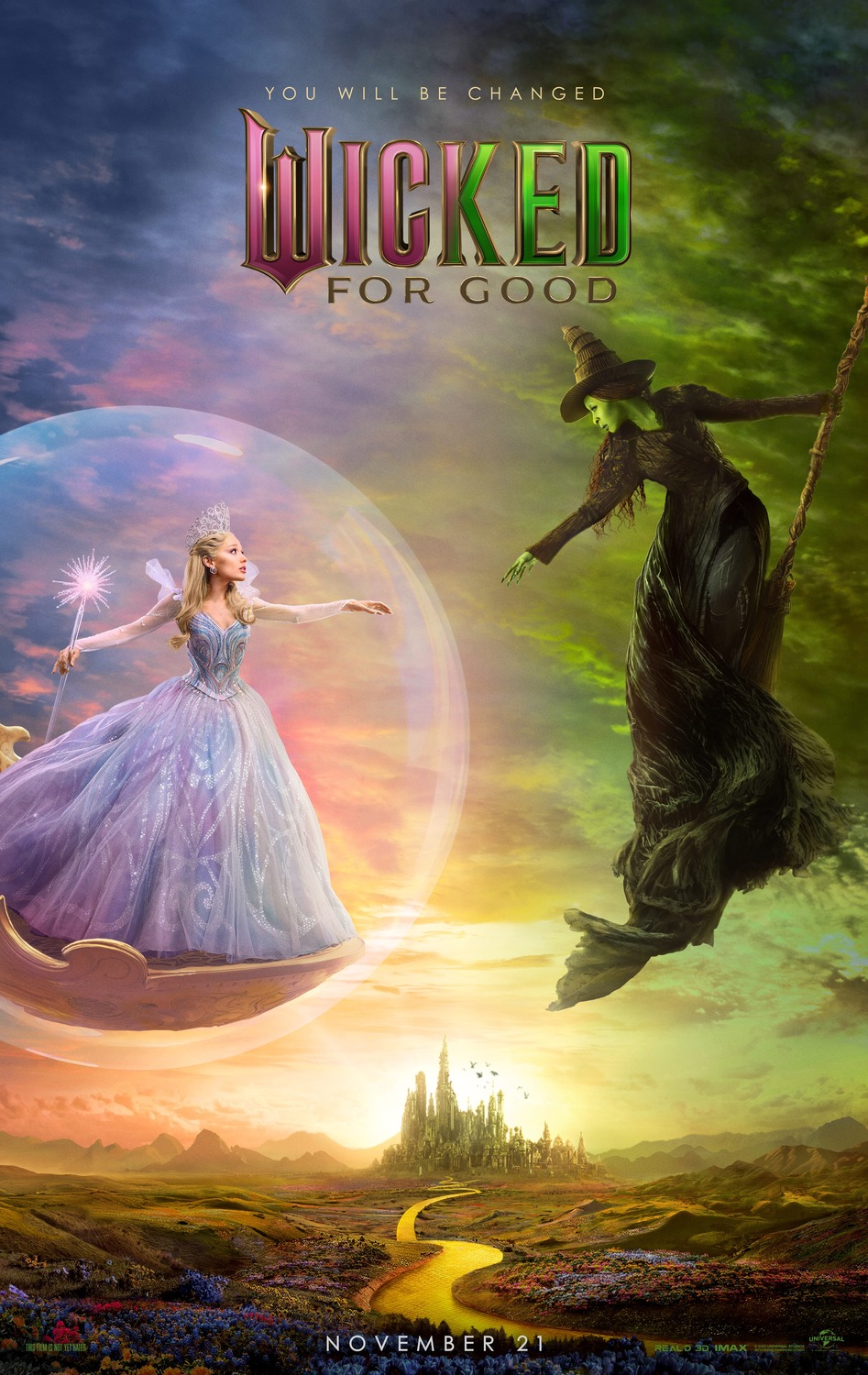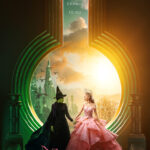Director
Jon M Chu
Starring
Cynthia Erivo
Ariana Grande-Butera
Jonathan Bailey
Michelle Yeoh
Jeff Goldblum
Set an indeterminate amount of years after the events of Wicked, Elphaba [Erivo] continues attacks on the Wizard’s [Goldblum] forces, who seek to enslave animals and suppress the people of Oz. Meanwhile, Glinda [Grande-Butera] maintains her role as figurehead of the state, to ensure a semblance of order and control. When in fact she and fiancé Fiyero [Bailey] are hoping to get to Elphaba before the rest of the guards can. Matters are complicated further when the Wizard’s vizier, Madame Morrible [Yeoh], manipulates a cyclone to bring a young girl from Kansas to disrupt Elphaba’s progress.
With Wicked For Good being the exact same cast and crew picking up where they left off, there’s a welcome continuity of quality and aesthetic. Yes, you have to wrestle with the excessive use of shallow depth of field lenses and lighting options that often make this world feel flat and a little sound-stagey. But the production design, costuming, hair and make-up are still extremely rich and while the CGI has some ropey moments, it’s largely engrossing. So, ultimately it feels like the same film and watching the pair back-to-back is a stronger experience for it. And with that concession to the technical side out of the way, let’s get into the meat of the problems.
Wicked For Good inherits the problems of the source material. Not necessarily the novel itself but the Broadway musical. While the first act is energetic, very funny, and infused with plenty of lore-bending revelations, the second is more dour-toned, rushed in places, and suffers without the strength of songs like “Popular” and “Defying Gravity.” The school setting also adds a sense of chaotic fun and emotional sincerity that made Wicked a lighter, oddly relatable experience; but Wicked For Good steps further into the adult world. And we’re given a story of punishment, body horror, rampant propaganda, and the fall to fascism, making it a darker, more morbid instalment. Which, in and of itself isn’t an issue, but serves to create a weaker half by comparison.
It also has the difficult task of telling the entire story of The Wizard Of Oz from a peripheral point of view. See, the stage production shies away from the original story, simply giving allusions to key narrative points from a parallel. However, this rushes the story along when it becomes too familiar, leaving the collected account incomplete. Sure, this is not Dorothy’s story and the creators are merely honouring the beloved and highly awarded stage production, but it makes the entire storyline remarkably hollow and anticlimactic. Especially when you have an accumulated runtime that almost doubles the musical’s length and, for all the padding and commotion, very little actually happens in this second chapter. And the reason I’m giving this so much attention is because all the woes and failings of this movie can be directly attributed to this loyalty. Characters appearing, references made, arcs just ending without acknowledgement, the sense of wandering malaise, they’re all byproducts of a conclusion that worked on stage in a much shorter undertaking.
So, what of the performances? Outside of the movie itself, the cast have continually made industry headlines for their devotion to one another and quirky mannerisms. In truth, this continues to be one of the film’s greatest strengths. As with Wicked, the central chemistry is paramount and powers this entire endeavour. The scenes Erivo and Grande-Butera share are the most enjoyable in terms of the excess of heart and genuine joy. But, by contrast, when they’re apart the film loses steam and never hits those heights. Sure, the supports do a wonderful job. Yeoh as Morrible is cruel and poised, Bailey is as charmingly foppish as ever, and Goldblum chomps through the scenery with great abandon. So, on paper, there shouldn’t be a lot of lulls or breaks in momentum. But owing to the story’s more sinister timbre, most of the encounters are soured somewhat. I should also note that everyone’s voices are on form and each song is delivered with exceptional skill and prowess. However, returning to my earlier comment, sure the songs For Good and No Good Deed take centre stage, but they’re arguably the only songs that have significant weight, presence, and don’t feel like a reprise or a pale reflection of the hits of the first half.
What surprises and disappoints me the most is that Wicked gave itself the room for development and nuance. It filled in the gaps, took up the stage, and really allowed the chemistry and interactions to breathe. We weren’t being hurried through this rising friendship and shattering of perceptions, as an audience, we were taken slowly on that journey. Frustratingly, despite the over two hour runtime, these necessary changes and adjustments aren’t made here. And in contrast, Wicked For Good loses that confidence of focus and breadth. Meaning this darker, gloomier, more rushed half of the story was never going to stick the landing because it couldn’t commit to the architectural overhaul that would have benefited a cinematic two-parter. And, as always, while honouring the source material is important, you still have to serve the medium in which you find yourself. It’s no good saying “I know this doesn’t work but that’s how it is in the musical.” Because you’ve already admitted defeat. So, is Wicked For Good a catastrophic crash and burn? A fall from grace that will set musical cinema back decades? Not in the slightest. It remains a compelling, beautifully performed, lavish production that brings a now iconic alternate take on The Wizard Of Oz to the big screen. And in spite of my reservations and highlighting of flaws, it will stand as an incredibly pleasing and powerful adaptation for new and longtime fans.
Release Date:
21 November 2025
The Scene To Look Out For:
One scene in particular illustrated how chaotic the final third of this movie was going to be. And that was the arrival of Dorothy. On the one hand, you have the death of Elphaba’s sister Nessa [Marissa Bode] but this feels oddly neutered. Not only because her character has become a twisted, cruel overseer like her father. But more the direct impact on Elphaba and Glinda. Because one is upset and one is in denial but both end up fighting in a much needed moment of glorious levity. And going from “you gave her a dead woman’s shoes” to “what’s that cackle all about?” will give audiences painful tonal whiplash.
Notable Characters:
I mentioned earlier that a problem with side-stepping everything related to Dorothy’s presence in Oz is the amount of important and entirely abandoned arcs. The best example? Boq [Ethan Slater]. He is a weaselly little shit who, in this volume, finds himself at the mercy of a governess abusing her power. But then he also suffers a grim fate – i.e. becoming the Tin Man – and devolving into a murderous rage. There’s nothing wrong with that, that’s compelling. But it’s wholly unresolved and makes his character feel meaningless. It’s there to repaint our opinions of the familiar Tin Man but doesn’t actually conclude. And no amount of “Well he definitely threw himself into the role” will save his now pointless inclusion from minute one.
Highlighted Quote:
“The truth isn’t a thing of fact or reason, it’s simply what everyone agrees on.”
In A Few Words:
“A darker outing that was always going to magnify the problems of the musical thanks to its loyal adaptation.”
Total Score: 3/5

![The Red Right Hand Movie Reviews [Matthew Stogdon]](https://reviews.theredrighthand.co.uk/wp-content/uploads/2021/12/cropped-header1.png)



